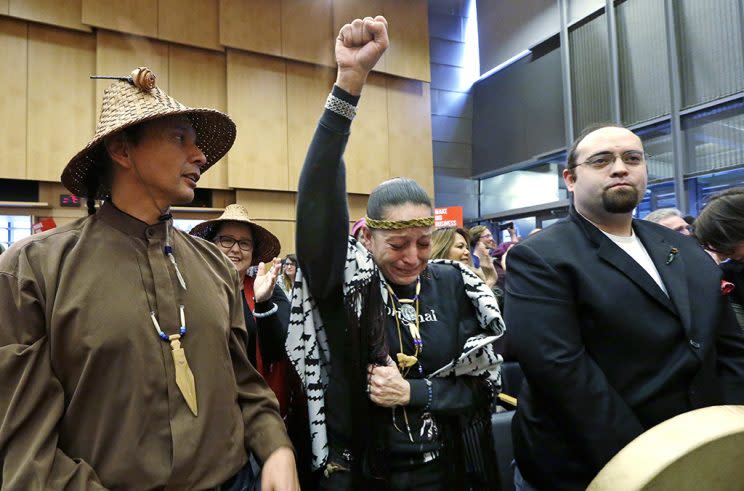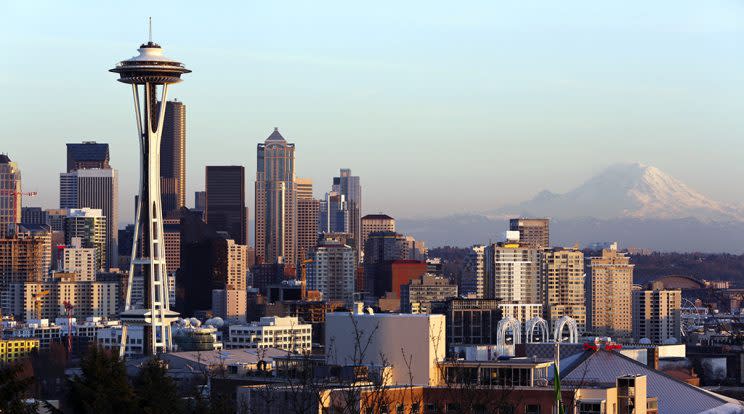From immigration to the Dakota Access pipeline, Seattle takes the lead in resisting the Trump agenda

As the cities — or at least the mayors — of blue America vie for the mantle of resistance to the Trump administration’s domestic, foreign, environmental and labor policies, Seattle seized an early lead with a decision Tuesday to stop doing business with Wells Fargo over the bank’s role in funding the Dakota Access pipeline. Mayor Ed Murray has already defied President Trump’s threat to withhold aid to “sanctuary cities,” having vowed he will oppose it even if it costs “every single penny” in federal funds.
“We will not be intimidated by the authoritarian message coming from this administration,” Murray proclaimed at a press conference in January, referring to Trump’s plans to restrict immigration and crack down on undocumented immigrants.
The Dakota Access pipeline, which was shelved by the Obama administration but has been revived by Trump, has been a flashpoint for environmentalists and Native American activists for years. Wells Fargo is one of a dozen banks that are lenders to the project, and had already been targeted last year by the city, which canceled a planned $100 million bond issue over news that the bank had been bilking retail customers for years, resulting in $190 million in fines. The unanimous vote by the City Council on Tuesday means that the city’s operating accounts, which handle around $3 billion a year, will have to find a new home when the contract with Wells Fargo expires in late 2018.
“You have been a city setting the example to the world, and I look to you to do that now,” said Olivia One Feather of the Standing Rock Sioux tribe. “When big cities such as this do the right thing, it sparks hope in the world.”

Studies have pegged Seattle as one of the most liberal cities in the United States, in a state that gave Trump only 38.1 percent of the vote in November. It is represented by two Democratic senators in Washington and is the home of such progressive companies as Starbucks, Microsoft and Amazon, as well as Nordstrom, the department store company the president attacked Wednesday on Twitter for dropping his daughter Ivanka’s clothing line. Another large local employer, Boeing, the country’s leading exporter, has had a rocky relationship with the Trump administration over foreign trade issues and the cost of a replacement plane for Air Force One.
Some of the legislation rolled out in the area almost reads like a wish list for Democrats nationwide. In 2012, voters in the state approved both same-sex marriage and the use of recreational marijuana. As far back as 2003, Seattle voters moved to make policing adults using marijuana the lowest priority for area law enforcement, essentially decriminalizing weed. In 2015, Seattle began the process to raise the city’s minimum wage to $15 per hour by 2020. The state of Washington followed suit in November, passing a ballot initiative that would raise the state minimum wage to $13.50 by the same year. And Seattle residents voted last year to increase property and sales taxes in order to fund an expansion of mass transit in the area.
But the politics of immigration have galvanized the city like few other issues. Murray, a long-time state legislator, who was elected in 2013, has also said that he plans to maintain Seattle’s status as a so-called sanctuary city, ignoring the White House executive order targeting undocumented immigrants.
Washington was one of two states bringing a lawsuit that won a temporary restraining order against the president’s Muslim immigration ban, and the attorney general who filed the stay, Bob Ferguson, is a Seattle native. James Robart, the federal judge who ruled in favor of the state, is another Seattle native whose chambers are located in the city.

While a recent Atlantic article highlighted the difficulties some liberal cities have had with state decisions overriding city-level legislation, Seattle’s policies should be in the relative clear, even though most of the eastern portion of the state leans Republican. Their governor and the state house are both Democratic, mitigating the GOP’s small edge in the state Senate. (A ballot initiative that would have either cut the state sales tax or made it more difficult for the state Legislature to raise taxes passed in 2015 but was subsequently struck down by the state Supreme Court.)
Federal money is another matter, and the city is taking precautions in case the White House reduces or eliminates its funding in the battle over immigration. In a press conference last month, Murray said that he had instructed departments to prepare budget cuts in case the approximately $75 million of federal funding in the city’s $5 billion budget was pulled.
“It’s important to remember that the courts have clearly said that you cannot punish or coerce a jurisdiction by taking away their money,” said Murray. “It also says if there is not a nexus or connection between the program you’re trying to enforce and the funds, you can’t cut those funds.”
Murray did say that $10 million in federal law enforcement funding could be vulnerable, because it could be directly tied to any refusal to enforce federal immigration laws. But he vowed he would not cooperate with the administration on what he views as civil rights issues.
“The language in the executive order affecting sanctuary cities talks about giving the immigration police complete authority as an individual to decide if there is cause to detain somebody,” Murray said. “I can’t compromise on that issue. That is police authority like we have never seen in this country.”
Read more from Yahoo News:



